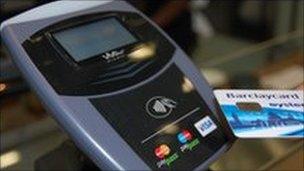Contactless card payments limit rises to £20
- Published

The technology is already used by some retailers in an attempt to reduce queuing times
The price limit on purchases made using wave-and-go card technology has risen from £15 to £20.
Customers pay for small items by holding their debit or credit card to a reader without entering a Pin code.
Fifty national retailers now use the system in their stores, including Greggs, Boots and McDonald's.
The limit increase comes shortly before the Post Office starts to add the contactless payment terminals to all of its 11,500 branches.
"We are delighted to be delivering cutting-edge technology through the Post Office network," said Lesley Sewell, chief information officer at Post Office Limited.
"Contactless will bring huge benefits to our customers by reducing transaction times."
Quick transactions
The change in the maximum value that can be spent at one time brings the UK into line with the eurozone's 25 euros limit.
The increase to £20 will take effect in stores at some stage between Friday 1 June and the end of the month.
The contactless technology allows cardholders to press their debit card to a sensor in thousands of UK shops to register a payment.
The money is automatically deducted from their bank account or added to their credit card bill.
The technology has been more widely adopted in East Asia, where the chip found in a plastic card is placed in an everyday item such as a mobile phone or a watch.
Melanie Johnson, chair of the UK Cards Association, said: "Low-value transactions have been gradually moving from cash to card.
"Contactless cards provide another convenient and fast method for paying for low-cost goods and services.
"They attract the same level of protection as traditional plastic cards - meaning that customers will suffer no loss if they are a victim of fraud," she added.
Post Office
Currently there are about 23 million of the contactless cards in issue, and all the big banks issue them.
In the view of the banking industry, the £20 limit will make the cards more appealing to users as it will let them pay for a small basket of goods in a supermarket or convenience store, rather than just for one or two small items.
In the UK, the Post Office has announced that it will become the largest adopter of the new technology in Europe.
It will install terminals at 200 branches around the London 2012 Olympics sites from 6 June.
The remaining branches across its network will be equipped by the end of October, with 30,000 counters offering the method of payment.
The Post Office said that Mastercard Paypass and Visa Paywave cards would be accepted for most products and services which can be paid for with a credit or debit card at present.
The only exceptions are purchases for more than £20, or those involving notes or cash, such as bureau de change transactions or when making bank withdrawals and deposits.
Some shopkeepers have raised concerns that as more people start to use cards, instead of cash, the cost to retailers increases.